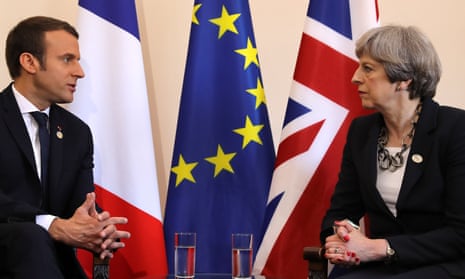Theresa May will attempt to reassert control over the political agenda by agreeing a new counter-terror strategy with the French president, vowing to fine tech companies such as Facebook and Google if they do not step up efforts to combat online radicalisation.
The prime minister and Emmanuel Macron will launch a joint campaign on Tuesday to tackle online radicalisation, a personal priority of the prime minister from her time as home secretary and a comfortable agenda for the pair to agree upon before Brexit negotiations begin next week.
In particular, the two say they intend to create a new legal liability for tech companies if they fail to remove inflammatory content, which could include penalties such as fines.
The prime minister’s first visit to the Élysée Palace since Macron’s election comes at a time of starkly contrasting fortunes for the two – the French president’s new party, La République En Marche, topped the polls in Sunday’s first round of legislative elections, while the Conservatives lost their majority in the snap general election.
May and Macron will meet at the Élysée Palace on Tuesday afternoon before a working dinner and will then attend the England v France football friendly at the Stade de France in the evening.
One official said the two leaders attending the match would be a chance to “celebrate our friendship and solidarity” and remember the victims of the Manchester and London attacks. There will be a minute’s silence before kick-off.
At the bilateral talks in Paris, May and Macron are expected to agree ways in which France and the UK can develop tools with tech companies to stop online extremism, with No 10 highlighting how both countries have been hit recently by terror attacks in London, Manchester, Nice and Paris.
The home secretary, Amber Rudd, and Macron’s new interior minister, Gérard Collomb, will meet in the coming days to hammer out the details of the policy initiative. No 10 said the talks would also advance the establishment of an industry-led forum to develop shared technical and policy solutions to the problem, as agreed by world leaders at last month’s G7 summit in Italy.
May said the need to tackle to radicalisation online was a priority for both countries. “The counter-terrorism cooperation between British and French intelligence agencies is already strong, but President Macron and I agree that more should be done to tackle the terrorist threat online,” she said. “In the UK we are already working with social media companies to halt the spread of extremist material and poisonous propaganda that is warping young minds. We are united in our total condemnation of terrorism and our commitment to stamp out this evil.”
Yvette Cooper, the Labour MP and chair of the home affairs select committee, welcomed the proposed legislation. “Social media companies like YouTube have been getting away with a dangerous and irresponsible approach to extremism for too long. Still today YouTube is showing illegal propaganda videos for banned jihadi and neo-Nazi extremists,” she said.
“They have a disgraceful disregard for the law. The cross-party home affairs select committee called for a system of fines and stronger legislation. So if that is what the British and French governments are working on now, that is really welcome. They need to make rapid progress, because online radicalisation is a very serious threat, and this problem has been growing for a long time.”
An Elysée official said Macron and May’s working dinner would focus on security issues “to look at the possibilities for deepening our cooperation on counter-terrorism, both bilaterally and on a European basis”.
Regulating extremist content online featured heavily in May’s response to the terror attacks at the Ariana Grande concert in Manchester and on London Bridge, which both occurred during the general election campaign.
The Tory manifesto outlined measures to push internet companies further on their commitment to identify and remove terrorist propaganda, and stop terrorists communicating online, including a pledge to examine how to tackle encrypted communications between extremists.
In a speech after the London attack, in which eight people were killed when three attackers knocked down pedestrians in a van and stabbed people in Borough Market, May vowed to clamp down on internet hatred. She accused big internet companies of giving terrorist ideology “the safe space it needs to breed” online.
“That is precisely what the internet and the big companies that provide internet-based services provide,” she said. “We need to work with allied democratic governments to reach international agreements that regulate cyberspace to prevent the spread of extremist and terrorism planning.”
However, her plan for further regulation of the internet was criticised by some campaigners, including the Lib Dem leader, Tim Farron, who said further state censorship was not the answer.
